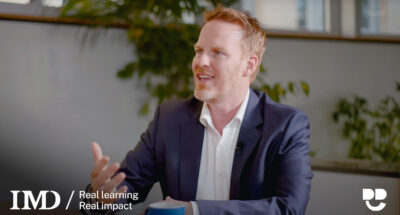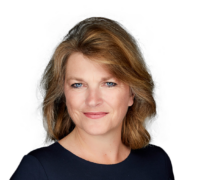
How does sustainable leadership work?
This episode takes you behind the scenes of a recent gathering led by the World Business Council for Sustainable Development together with IMD, where David Bach sat down with two sustainability leaders....

by Heather Cairns-Lee Published April 2, 2025 in Leadership • 7 min read
A former member of the GB rowing team in her youth, Katrina Edmunds hung up her oars and drifted in a different direction to pursue a career in education. For more than two decades, she stayed off the water until the lure of Lake Geneva, Switzerland, called her to return. The years she spent on the waterways of the UK as a teen instilled in her a relentless pursuit of excellence, mental toughness, a deep understanding of collaboration, and a profound connection to the water. Now, with a thriving career in international education and a full schedule as a wife and mother to twin daughters, she looked at Lake Geneva and questioned whether she could still call herself a rower.
Between work and family commitments, Edmunds felt she had no time to spare – certainly not for the grueling training that rowing demands – and the idea of returning to the sport seemed unrealistic. However, one day at a BPW Lake Geneva event, she heard a woman tell the story of how she had rowed 160km around the lake. Even in her prime, Edmunds had never rowed more than 30km, and she could still remember the all-encompassing exhaustion that ensued. Yet, something within her longed for reconnection – not just to the sport, but to a fundamental part of her identity and to belong once again to a community of strong women, as she wondered: “What if I could?”
When an acquaintance subsequently invited her to substitute in a quadruple scull at Rowing Club Lausanne, she accepted with relish.
When an acquaintance subsequently invited her to substitute in a quadruple scull at Rowing Club Lausanne, she accepted with relish. Initially, she doubted if she could even get strong enough to row well. Then she met Natalia, a competitive rower with a similar background from the Spanish squad who matched her drive and desire to see just how far they could go in their 40s. Their shared ambition led them to set a bold goal: win the Swiss Championships, and the World Masters, before extending the distance to take on the Tour de Léman (Lake Geneva), with an all-female crew.

They clocked up the kilometers – consistent in their early mornings to seek the still water, exhaustion balanced against progress. Juggling full-time work, motherhood, and a rigorous training regimen required discipline, sacrifice, and unwavering focus and the scheduling alone took the mental load to another level. However, stroke by stroke, Edmunds wasn’t just rebuilding her strength, she was reclaiming confidence in who she was. And she had found her crew: a team of strong women from Switzerland and around the world, united in the pursuit of excellence. They made the time to formulate a shared vision and plan their goals – and remained consistent despite the execution while juggling the challenges that mid-life brings on all fronts: careers, relationships, and families.

Their training and focus paid off in gold, winning multiple medals at the Swiss Rowing Championships, not only in the double but also with the crews they formed. Katrina and Natalia won the World Masters and the RCL women, have been dominating the Swiss Masters racing scene for the last few years.
For Edmunds, the victory was a moment of affirmation. She was a rower again. She fell back in love with rowing – blisters and all. With her crew from the very “Sporty September” of 2022, they explored the depth of their passion and commitment together, winning all their events:
The Bilac (37km marathon, Neuchâtel)
And the Tour de Léman, a grueling 160km race around the largest enclosed body of water in Europe.
More than the wins, returning to rowing reignited a sense of purpose. It reconnected Edmunds with a community that had shaped her youth, restored balance in her life, and reaffirmed her passion for pushing limits. What she didn’t anticipate, however, was how it would also become her classroom for lessons in resilience, emotional intelligence, communication, collaboration – and, indeed, leadership.

As Edmunds trained for and endured these tough events, she could reflect on a life full of rich experiences and recognize how deeply rowing models the demands of great leadership. Success on the water requires resilience, teamwork, adaptability, and the ability to make high-pressure decisions – qualities that define exceptional leaders.
Trust is essential – each rower must fulfill their role while relying on others to do the same.
Rowing is ultimately a team sport. Every stroke must be synchronized to propel the boat forward. Trust is essential – each rower must fulfill their role while relying on others to do the same. Beyond technical skills, each rower must try to feel what their crewmates are feeling. This reflects high-performing teams in business, where collaboration through compassion is key to success.

Rowing is unforgiving. Athletes train before dawn in all conditions – rain, wind, or shine. This demanding routine builds mental toughness, teaching individuals to push through discomfort and remain focused under pressure. Similarly, leaders face high-stakes negotiations, crises, and relentless challenges. The ability to endure and excel under stress is critical for success. Rowing teaches you to manage your emotions and breathe deeply through the pain to build mental toughness.
Leaders must navigate uncertainty, assess risks, and make calculated decisions in real time.
In rowing, split-second decisions determine victory or defeat. Whether adjusting the stroke rate in response to competitors or adapting to unpredictable weather, rowers must think critically and act swiftly. And communicate and act on this in unison. Likewise, leaders must navigate uncertainty, assess risks, and make calculated decisions in real time.

Rowing fosters deep trust and emotional awareness within the crew. Understanding teammates’ strengths, weaknesses, and motivations is essential to support each other, especially when the rowing gets tough – as it invariably does. Connection is what makes a team strong. Similarly, great leaders possess high emotional intelligence, and read situations and people effectively to inspire and unify teams to perform at the highest levels.
Edmunds’ return to competitive rowing wasn’t just a personal challenge – her return to competitive sport revealed lessons in leadership. It reinforced her ability to set ambitious goals, build resilience, and push beyond perceived limits.
As a professional, mother, and athlete, she demonstrated that you can care and compete; that ambition and passion can coexist and that to lead is to act, not to take power. She became a role model, showing her daughters and other future female leaders that persistence and self-belief can shatter barriers.
It proved that women in sports, like in leadership, belong at the highest levels.
When Edmunds and her crew crossed the finish line of the Tour de Léman, completing their 160km endurance test and bringing an end to “Sporty September”, she knew it was more than just a race. It was a statement. And one that she has, and will make again, and again.
It proved that women in sports, like in leadership, belong at the highest levels. That ambition, passion, and resilience can be nurtured to overcome obstacles.
Edmunds continues to row with her RCL crew, racing at senior level for the last two years and forming an eight with the new female members attracted to the club. Her project for this year is to support Tereza, a world champion indoor rower, in learning how to row and race the water.
Her journey back to rowing isn’t just about competition – it is about setting bold goals, building self-belief, embracing discomfort and consistency, and, most importantly, creating a great crew and a positive community. It is about proving, once again, that leadership isn’t about power over, but empowering others through what you do and how you rise to meet the challenge.

Affiliate Professor of Leadership and Communication
Heather Cairns-Lee is Affiliate Professor of Leadership and Communication at IMD. She is a member of IMD’s Equity, Inclusion and Diversity Council and an experienced executive coach. She works to develop reflective and responsible leaders and caring inclusive cultures in organizations and society.

Rower
A former member of the GB rowing team in her youth, Katrina Edmunds hung up her oars and drifted in a different direction to pursue a career in education. Today, she combines a thriving career in international education, and a full schedule as a wife and mother to twin daughters, with her passion for rowing.

April 17, 2025 • by David Bach, Felix Zeltner in Leadership
This episode takes you behind the scenes of a recent gathering led by the World Business Council for Sustainable Development together with IMD, where David Bach sat down with two sustainability leaders....

April 17, 2025 • by Michael Skapinker in Leadership
All organizations should have a plan to secure trust during, after (and even before) a crisis hits. Here are a host of examples, good and bad, to learn from....
 Audio available
Audio available
April 15, 2025 • by Knut Haanaes in Leadership
Writing reports that go unread, weekends wasted working on non-essential tasks, and unrealistic targets that can never be met. Top talent is being left exhausted and demoralized. Here are seven ways to...

April 11, 2025 • by Michael D. Watkins in Leadership
Michael Watkins outlines the simultaneous need for acuity and inner rootedness – what he calls Grounded Edge Leadership – to navigate increasing change and uncertainty....
Explore first person business intelligence from top minds curated for a global executive audience